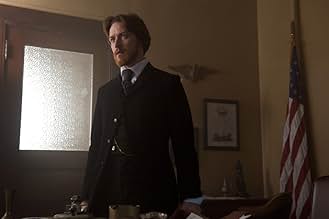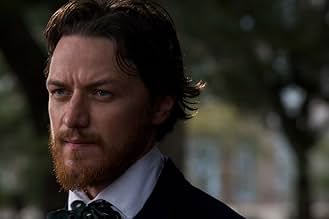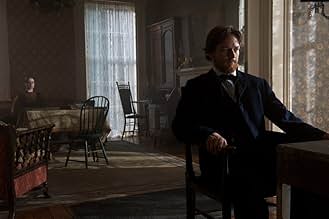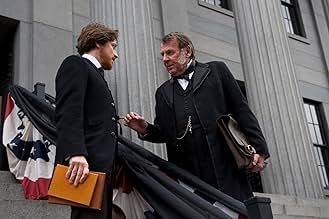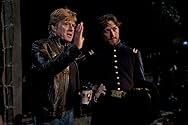Mary Surratt est accusée d'être un co-conspirateur dans l'assassinat de Lincoln. Alors que la nation se retourne contre elle, elle est contrainte de s'en remettre à son avocat pour découvrir... Tout lireMary Surratt est accusée d'être un co-conspirateur dans l'assassinat de Lincoln. Alors que la nation se retourne contre elle, elle est contrainte de s'en remettre à son avocat pour découvrir la vérité.Mary Surratt est accusée d'être un co-conspirateur dans l'assassinat de Lincoln. Alors que la nation se retourne contre elle, elle est contrainte de s'en remettre à son avocat pour découvrir la vérité.
- Réalisation
- Scénario
- Casting principal
- Récompenses
- 2 victoires et 3 nominations au total
Avis à la une
The film opens with some scenes from the Civil War battlefield where we meet the severely wounded soldier Frederick Aiken (James McAvoy) attempting to save the life of his buddy Nicholas Baker (Justin Long). The film then jumps to the end of the war when the Confederate generals have surrendered to the Union generals and parties are underway. Aiken and Baker have survived and Aiken has decided to pursue law. The President is assassinated by John Wilkes Booth and in the aftermath Booth is killed but it is discovered that there was a plot to kill Lincoln as well vice president Andrew Johnson (Dennis Clark) and secretary of state (Kevin Kline). The response of the nation is terror and the suspects of the conspiracy are arrested and set for trial. The conspirators had been meeting in the boarding house of Mary Surratt (Robin Wright) so the military decides she must also be a conspirator and tried with the others 'to put this madness to an end.' The men in charge of the tribunal include Joseph Holt (Danny Huston) and David Hunter (Colm Meaney). There is one lawyer, Reverdy Johnson (Tom Wilkinson) who feels that the tribunal is not an acceptable manner in which to try a citizen and assigns the fresh new lawyer Frederick Aiken to defend Mary Surratt. At first Aiken hates his role but as time passes and he gets to know Mary Surratt he is convinced of her innocence and implores Mary (and Mary's daughter Anna - Evan Rachel Wood) to reveal the location of the true problem in their family - Mary's son John (Johnny Simmons). The story features the change of approach of Aiken and the abuse of justice at the trial and the film ends with some very poignant lessons not only about our history but also about our present.
The pacing of the film is slow at times, but the cinematography by Newton Thomas Sigel and the musical score my Mark Isham keep the film involving. James McAvoy offers a sterling performance and the rest of the cast is impressive. THE CONSPIRATOR is a healthy dip into our nation's past and makes us more alert to our nation's present.
Grady Harp
Since the whole story is told from his point of view, it emerges as a realistic depiction of how events might have unfolded, taking no firm stand on the innocence or guilt of the accused. As the nation mourns the sudden death of its leader taken from them just as the Civil War ended, we are told that justice must be swift to heal the wounds of the public and satisfy a thirst for revenge. It's that viewpoint that makes this film relevant today, in view of other controversial historical events, but first and foremost the assassination of President John F. Kennedy in 1963.
One glaring quibble: Apparently, to fully immerse the viewer in this time of history and to suit the flavor of the grim tale, Redford has chosen to use very muted color photography so that this is almost a sepia tone experience. But do we have to be reminded so flagrantly that this was the candlelit era? Scenes outside of the courtroom could have used flashes of real color, as could the social circle interiors of other scenes instead of keeping the low-key lighting so constant. It became a distraction for me. He may as well have used glorious B&W.
Other technical aspects are fine and the background score is effective without becoming overwhelming. ROBIN WRIGHT PENN plays Mary Surratt with quiet dignity and strength. KEVIN KLINE is almost unrecognizable as the stubbornly determined EDWIN STANTON seeking quick justice, EVAN RACHEL WOOD is effective as the distraught daughter Anna Surratt, and JOHNNY SIMMONS is sobering as the accused woman's son who manages to escape imprisonment for his role in the John Wilkes Booth caper. His character, unfortunately, isn't fleshed out at all.
Biggest supporting role goes to TOM WILKINSON as the man who urges McAvoy to take the defense case against his wishes. He and McAvoy share most of the running time on screen and do magnificent jobs.
History buffs will no doubt find this more interesting than the average movie fan looking for a more adventurous look at the past, but despite flaws, it is competently made and does recreate the actual events in a satisfying manner by use of flashbacks and an intelligent script. But did it have to be so dark?
This film focuses on the trial and aftermath of the Lincoln assassination and most particularly on Mary Surratt at whose boardinghouse in Washington, DC, John Wilkes Booth and his curious band of conspirators met and plotted. One of those was Mary's son John who was the only one to escape apprehension.
The villain in the film is Secretary Of War Edwin M. Stanton played by Kevin Kline. It was not hard for him to do what he did, he certainly had public approval. The assassinated president Abe Lincoln had suspended the right of habeas corpus during the war, so this trial by military tribunal was not an unforeseeable step that Stanton would take. It is important to remember that at the time we actually were at war with Confederate Armies still in the field. Lee surrendered to Grant at Appomattox five days before the assassination, but Joe Johnston was in the field and when it is announced that the last Confederate Armies have surrendered the day of the hanging, they are referring to Richard Taylor's troops in Texas.
James McAvoy is a young army veteran and lawyer who becomes Mary Surratt's lawyer. In the end he believes in her innocence, but the forces of vengeance are too much for him to overcome. And while Surratt might not have been as innocent as the film makes out, no case beyond reasonable doubt was proved at least by the rules of any civil trial that should have taken place.
The film really belongs to Robin Wright as the implacable and fatalistic Mary Surratt. She definitely merits some Oscar consideration next year. Up there on the screen she becomes everyone's mother and one wonders about Johnnie Simmons as John Surratt seen in flashback as to why he isn't coming to the plate on this.
Perhaps because even Stanton was afraid of public opinion if two Surratt women were in custody on trial for their lives daughter Anna Surratt played by Evan Rachel Wood was never charged. She must have had some knowledge of what was going on. One aspect of the story I think Redford missed and I'm surprised as he's an actor and matinée idol back in the day himself. John Wilkes Booth though his southern sympathies were well known though his plotting a secret, was the great matinée idol of his day. And he certainly attracted his fair share of what would be called groupies back in the day. I think he probably favored Anna Surratt and certainly John Surratt was glad to be included in his entourage. Put in those terms the relationship becomes clearer.
Still Redford has crafted a justly well received film and it will no doubt lead to talk about the rights of the accused of the worst kind of crimes.
Le saviez-vous
- AnecdotesThe Surratt boarding house still stands in Washington, DC's Chinatown.
- GaffesWhen Booth is trapped and killed, he still has his distinctive mustache. He shaved his face soon after he killed Abraham Lincoln, to make himself less recognizable.
- Citations
Edwin Stanton: Young man... always indebted to you for your courage in the field, but you must learn to tread lightly.
Frederick Aiken: Tread lightly? I will not tread lightly. You have predetermined her fate.
Edwin Stanton: Mary Surratt's fate rests entirely with the Commission. My concern is preserving our Union.
Frederick Aiken: Why did I fight for the Union if my rights aren't assured? You tell me.
Edwin Stanton: Fine words for rallying the troops, not for running a nation. They assassinated our president, and someone must be held accountable. The people want that.
Frederick Aiken: It's John Surratt you want. You don't even want Mary.
Edwin Stanton: I'll settle for either one.
- ConnexionsFeatured in The Conspirator: Mary Surratt and the Plot to Kill Lincoln (2011)
Meilleurs choix
Détails
Box-office
- Budget
- 25 000 000 $US (estimé)
- Montant brut aux États-Unis et au Canada
- 11 538 204 $US
- Week-end de sortie aux États-Unis et au Canada
- 3 506 602 $US
- 17 avr. 2011
- Montant brut mondial
- 15 625 544 $US
- Durée
- 2h 2min(122 min)
- Couleur
- Mixage
- Rapport de forme
- 2.39 : 1







